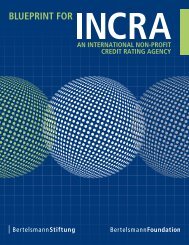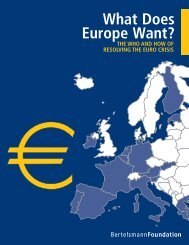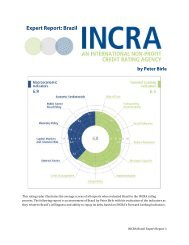CapitolWire Dec 2012.pdf - Bertelsmann Foundation
CapitolWire Dec 2012.pdf - Bertelsmann Foundation
CapitolWire Dec 2012.pdf - Bertelsmann Foundation
You also want an ePaper? Increase the reach of your titles
YUMPU automatically turns print PDFs into web optimized ePapers that Google loves.
temporary exemption from the ETS for non-EU year exemption period—it made official the<br />
airlines. She cited progress at ICAO-led Inspiring global US People. government’s Shaping support of an the international Future.<br />
<strong>CapitolWire</strong><br />
negotiations on the issue as the reason for the approach to reducing aviation emissions.<br />
exemption.<br />
The EU’s proposed freeze on the application<br />
to non-EU air carriers is set to continue<br />
The Brussels Connection to Capitol until the 2013 Hillmeeting of ICAO, by which<br />
time an international agreement on aviation<br />
emissions may be achieved. Regardless of<br />
the temporary exemption, President Obama WASHINGTON, DC<br />
BRUSSELS<br />
signed S. 1956 into law on November 27, 1101 2012. New York Avenue, NW Résidence Palace<br />
Suite 901<br />
Rue de la Loi 155<br />
Though the EU’s announcement rendered the<br />
Washington, DC 20005 USA 1040 Brussels, Belgium<br />
legislation irrelevant—at least for the<br />
Contact:<br />
one-<br />
Tyson Barker<br />
Contact: Thomas Fischer<br />
Sponsor of S. 1956: Senator John Thune (R-South Dakota)<br />
E-mail: tyson.barker@bertelsmannfoundation.org<br />
E-mail: thomas.fischer@bertelsmannstiftung.de<br />
The US Argument<br />
Washington’s stance on EU ETS has been to<br />
“support the goals, but oppose the action”,<br />
as Senator John Rockefeller, chairman of<br />
the Committee on Commerce, Science and<br />
Transportation, mentioned in a June hearing<br />
on the act. Proponents of S. 1956 recognize<br />
the necessity to reduce aviation’s impact on<br />
the environment but prefer an international<br />
approach.<br />
The EU ETS includes regulation of emissions<br />
produced by carriers while operating outside<br />
EU airspace and in countries that are simply<br />
being overflown. But the global aviation<br />
industry, the US and other countries contend<br />
that mandatory participation by non-EU<br />
air carriers in the ETS is a violation of state<br />
sovereignty. The US argues that international<br />
obligations of the Chicago Convention of<br />
1944 negate EU jurisdiction over regulating<br />
emissions in foreign or international<br />
airspace. The EU is not a signatory to the<br />
Chicago Convention, although all EU member<br />
states are.<br />
The costs of compliance are yet another<br />
concern. Though estimated to be minimal<br />
initially, charges to airlines and passengers<br />
are expected to increase as the EU ETS cap<br />
on total carbon-dioxide emissions decreases<br />
and the EU provides fewer CO 2<br />
allowances for<br />
air carriers to purchase. Estimates vary widely,<br />
but the US aviation industry believes the<br />
levies would amount to $3.1 billion between<br />
2012 and 2020.<br />
S. 1956: The EU ETS Prohibition Act<br />
Tel: (+1) 202.384.1993<br />
www.bertelsmann-foundation.org<br />
Tel: (+32 2) 280.2830<br />
www.bertelsmann-stiftung.de/brussels<br />
Market vulnerability and the use of collected<br />
revenues are other American concerns. A<br />
Senate Committee on Commerce, Science<br />
and Transportation report cites a European<br />
Commission proposal in July 2012 to raise<br />
carbon prices as evidence of the market’s<br />
susceptibility to manipulation. The ETS also<br />
has no requirement that revenue collected<br />
under the scheme must be used in research<br />
and development or initiatives aimed at<br />
reducing aviation emissions.<br />
The EU ETS Prohibition Act permits US air<br />
carriers to refuse participating in the EU ETS<br />
and gives the transportation secretary the<br />
authority to prohibit them from doing so.<br />
The act also directs the secretary, the Federal<br />
Aviation Administration (FAA) administrator<br />
and other officials to pursue an international<br />
agreement while ensuring US airlines are not<br />
penalized under the EU ETS.<br />
Two key amendments were added to S. 1956 to<br />
protect US taxpayers and grant the secretary<br />
more flexibility in determining US air-carrier<br />
participation. The first amendment, proposed<br />
by Senator Benjamin Cardin (D-Maryland),<br />
prohibits the use of taxpayer money to cover<br />
any taxes or penalties imposed on US air<br />
carriers for non-compliance with the EU-ETS.<br />
The senator’s proposal is partly in response<br />
to a provision of the EU ETS that makes an<br />
airline’s non-compliance subject to an “excess<br />
Key components of the EU ETS Prohibition Act of 2011<br />
Grants the transportation secretary the authority to prohibit US aircraft operators<br />
from participating in the EU ETS if deemed to be in the public interest<br />
Directs the transportation secretary, the Federal Aviation Administration chief and other<br />
appropriate officials to enter into international negotiations on aircraft emissions<br />
Directs appropriate officials to use applicable measures under existing<br />
authorities to ensure US air carriers are exempt from the EU ETS<br />
Prohibits the use of taxpayer dollars to pay for taxes and penalties<br />
imposed on US air carriers for non-compliance with the EU ETS<br />
Allows the transportation secretary to re-assess prohibiting<br />
US air carriers from participating in EU ETS<br />
DECEMBER 2012<br />
©Copyright 2010, <strong>Bertelsmann</strong> <strong>Foundation</strong>. All rights reserved.<br />
2






